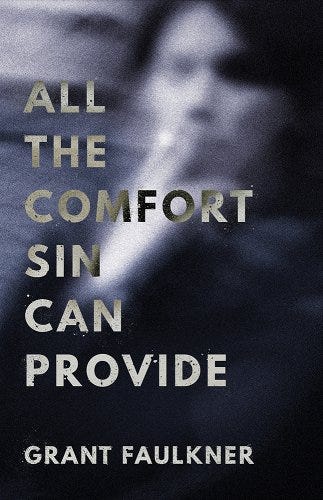A Grab Bag of Trinkets, Flotsam, Jetsam, Doo Dads, Dad Doos, Rusty Objects, Found Objects, Attempts at Erudition, Haiku— and More (but not less)
Because. Just because.
Dear Reader,
I’m less and less enamored of works of art that fit into the forms of what we expect them to. I find our world to be so fragmented and splintered and pixelated that “the whole story,” the story that is slick and refined and produced and complete, just isn’t as possible or engaging or meaningful in the way that it used to be.
I like art that I see scrawled on sidewalks and stray phrases that are recklessly dropped into spam emails (to the auteurs of spam emails, I thank you for such weird phrasings).
So this week’s newsletter is … something along those lines: formless, without intention to be whole, mixed up.
On the Subject of Spam
Subject line of recent email received:
*Fa-tty liv-er cure disco-vered in Anc-ient Rom-e?*
I love the weird use of hyphens (shall we say they’re avant-garde?). It’s as if the hyphens are included to give the beats of emphasis to sing this like it’s a line from a rap song.
I also love how it speaks to time travel. We have to go to ancient Rome to cure our fatty liver?
Maybe someday I’ll use spam lingo for writing prompts and view them as mystical guides to the truth of the universe.
Worst Writing Advice I’ve Received
I was thinking about this because I spoke to MFA students at Dominican University last night.
When I first decided to be a writer, a friend of my parents, a doctor, told me that I should study the five best-selling novels of all time, figure out what they did, and repeat it.
On one level, this wasn’t bad advice: it’s good to study those who are successful and be open to learning and guidance.
But … I think what he was getting at was that I should figure out how to commodify my writing, to make it into a product that a lot of people wanted to buy. To make my story into a widget.
I’d decided to become a writer as a fresh-faced, bushy-tailed young lad because I wanted to express myself and explore the challenging, dark, mysterious, glorious, divine, godless, joyful, illuminating truths of the universe.
So I didn’t take his advice. But I learned how people who aren’t writers love giving writers advice. Maybe I should have given him advice about how to be a doctor?
Because a Haiku
Again
and again
time keeps running outBecause Prompts Take Us to New Places
This graffiti reminded me of Goya’s La Maja desnuda.
Use this photo as a prompt, as a random catalyst, as an igniter for any writing project you're working on.
Or … write a story about this photo in less than 250 words and share it.
Because Brilliance
I like flash fiction because of how the very limitations of scale demand unconventional strategies. Because of its size, flash fiction invites using forms of writing that we use every day—such as the dictionary.
In Collective Nouns for Humans in the Wild, Kathy Fish playfully provides new and surprising labels for groups of people: “A group of grandmothers is a tapestry. A group of toddlers, a jubilance (see also: a bewailing).” She lists several other fun collective nouns, and then the story flows into a surprise ending that is arresting, provocative, and just plain brilliant.
Because a Quote
“Coming from white trash has advantages people with money don’t seem to understand. For years, I’ve watched friends whose parents are doctors and bankers live in FEAR (even while rebelling) that they don’t achieve enough, aren’t good enough, clean enough, and especially NOT thin enough. … Now, if you don’t mind I have a date with a delicious smartass with a trick jaw who’s on his way over to my place with freshly made chocolate pudding and a can of whipped cream!”
~ CAConrad
Because Whimsicality
His name was Ken, “like Barbie’s boyfriend,” he said when he met new people.
On date nights with his wife, he’d tell her, “Tonight you’re going to get the whole Kenchilada.”
It didn’t stop. He spoke Kenglish. He was a Kentrepreneur. Every night was full of Kentertainment. The Kengine was always revved up.
“I can’t take the Kentropy,” his wife told him at the divorce proceedings. “This is the Kending.”
All the Comfort Sin Can Provide
If you like this newsletter, please consider checking out my recently released collection of short stories, All the Comfort Sin Can Provide.
Lidia Yuknavitch said:
“Somewhere between sinister and gleeful the characters in Grant Faulkner’s story collection All the Comfort Sin Can Provide blow open pleasure—guilty pleasure, unapologetic pleasure, accidental pleasure, repressed pleasure.”
Grant Faulkner is executive director of National Novel Writing Month and the co-founder of 100 Word Story. He’s the author of Pep Talks for Writers: 52 Insights and Actions to Boost Your Creative Mojo and the co-host of the podcast Write-minded. His essays on creative writing have appeared in The New York Times, Poets & Writers, Lit Hub, Writer’s Digest, and The Writer.
For more, go to grantfaulkner.com, or follow him on Twitter at @grantfaulkner.






Great observation about career advice we receive in our youth. In my case, as in yours, the advice was often more useful in deciding what NOT to do.